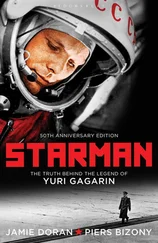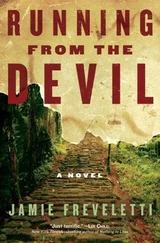“What about Berbera?” Sumner said.
“Berbera? That’s a Somali port, isn’t it?” Wainwright said. Sumner moved to a large map on the wall and pointed to the northern part of Somalia.
“It’s in the separatist republic of Somaliland. No one really uses it. Technically, the area is a part of Somalia, but it’s been run by the same warlord for over seventeen years now. Somaliland wants nothing more than to break away from Somalia, and they like Americans. They might welcome a chance to play protector. Show the world how different they are.”
Wainwright looked thoughtful. “It’s going to take longer to get there.”
“I’ve heard the port’s a broken-down mess,” Janklow said. “Dilapidated as hell.”
“So’s our ship, at the moment,” Wainwright said.
“They don’t get much foreign aid, so there’s no money for the port, or for anything else. The United States backs the transitional federal government in Mogadishu. And that government considers Somaliland to be squatters. They refuse to recognize the area as its own country,” Sumner said.
Wainwright gave a short laugh. “What government in Mogadishu? The city is a complete disaster, where anarchy reigns supreme. How the hell did we end up backing them and ignoring the peaceful regime located in the same region?”
Sumner shook his head. “I have no idea. But tensions between the separatists and the transitional government are at an all-time low. The transitional government is pushing the U.S. to denounce Somaliland. If we go there, this administration will be put in a difficult position.”
“They’ll have to be realistic. I can’t risk putting over three hundred civilians in at Mogadishu. It’s suicide,” Wainwright said.
“You’re both assuming we’ll get there, but it’s likely we’ll be attacked again long before we reach Berbera.” Janklow was once again ringing the negativity bell, and again Sumner had to agree with him.
“Short-term, we need to get security patrols going. How’s the perimeter system?” Sumner knew that the boat had an electrified outer railing to deter boarding in just such a situation, and that it was a recent addition.
“Second grenade took it out. Doesn’t work,” Janklow said.
“Guns on board?” Sumner spoke to Wainwright.
“Two stun guns and a couple of flare guns. No pistols. Your rifle is the highest-caliber weapon we have.”
“And it’s illegal,” Janklow said.
Sumner nodded. “The only one who’s seen it is Block. I’ll talk to him. Ask him not to broadcast it throughout the ship. We’ll have to double the security patrol. We should have at least two—one on either side and at the front and back—and they should work in shifts.”
Wainwright shook his head. “We don’t have the manpower for that.”
“We’ll need to recruit from the passengers,” Sumner said.
“I don’t want to alarm the passengers any more than we have to.”
“If they’re smart, they’ll feel safer to know that we’re taking steps to increase security. How about I start with Block? He already knows that we think they’ll be back, and he said he hunts. Means he must be able to shoot.”
“I don’t like that guy,” Janklow said, “and he sure as hell panicked just now.”
“He’s as big as a house,” Sumner said. “Someone like that gets frightened, he can do some damage. One of those whippet-thin Somalis climbs over the fence, he can just sit on the guy.”
Wainwright gave a grim laugh. “Let’s hope it doesn’t come to that.”
“I’ll put this gun away and go get him. Maybe he has some insight into the other passengers. Help us pick the security team.” Sumner grabbed his gun case and headed out.
The ship’s narrow hallways were empty. The passengers, ordered to their staterooms, had beaten a hasty retreat there. In the casino a dozen die-hard players sat at the blackjack tables, including the Russian and his mistress. They gambled with a joyless determination that reminded Sumner of the stories of passengers left behind on the Titanic, playing while the ship sank. He shook off the ghoulish thought. This ship would not sink. Not if he could help it. He jogged to his stateroom and shoved the titanium case back into the closet.
He found Block at the casino bar, nursing a scotch. Cindy was nowhere in sight. Sumner couldn’t help but feel thankful for that. He didn’t know how she’d handle her husband being tapped for the security team. He slid onto a stool next to Block, who didn’t turn his head but said, “You’re coming to ask me to keep quiet about what I saw, aren’t you?”
Sumner hid his surprise at Block’s cynical question. Something told him to lay it out plain.
“Only about the rifle. The rest you can shout to the world. Preferably the military world. Maybe they’ll send a destroyer to help us.”
Block snorted. “They’d better do it fast. Those pirates are coming back.”
The bartender stopped in front of Sumner. She was an attractive blonde, with green eyes, and even under the plain black-and-white uniform Sumner could see that she had a perfect figure.
She put a cocktail napkin on the bar in front of him and gave him a professional smile. “What can I get you?”
Sumner didn’t want a drink, but he ordered one anyway. “Maker’s Mark, neat.”
The bartender set the drink on the table, and Block raised his in a toast. “To killing the bastards.”
Sumner held his glass in the air. “To winning.”
Block paused, the rim of his tumbler at his lips. He lowered it a fraction. “Ain’t that the same thing?”
“Not if you’re bleeding out while you kill the last one,” Sumner said.
Block shook his head. “Jesus, Sumner, what the hell kinda comment is that? Aren’t you a little young to be so jaded?”
Sumner took a swallow of his drink. The liquor scorched his throat. Even though he hadn’t wanted it, the whiskey seemed like the perfect solution to his problems. He kept silent. He didn’t care to go into his experience in Colombia. When Block saw that he wasn’t going to respond, he changed subjects.
“What’s the plan up there with the officers?”
“Round-the-clock security beefed up by enlisting willing passengers to take shifts. Your name came up, since you said you could shoot. You can shoot, can’t you?”
“You ever met a Texan that couldn’t shoot?”
Sumner shrugged. “I’m sure they exist.”
“Well, I ain’t one of them.”
“So you’ll take a shift?”
Block nodded. “But don’t tell me we’re headed to Mogadishu.”
Sumner shook his head. “We’re going to a small port in the northern part of Somalia run by separatist rebels.”
“I don’t fancy the sound of that. Do we like these guys?”
Sumner took another sip of the drink. It was even better on the second go-around. “If by ‘we’ you mean the United States government, the answer is complicated.”
“Then why the hell are we going?”
“The people are honest. In Somaliland the moneylenders leave stacks of cash unattended while they pray in church, and when they return, it’s still there.” Sumner thought the citizens hesitated to steal not out of honesty but out of fear of the controlling warlord, but he wasn’t about to express his opinion to Block.
Block snorted. “They don’t sound honest—they sound damn stupid.”
“They won’t kill us.”
Block clinked his glass against Sumner’s. “Well, let’s get there quick.”
9
MUNGABE SAT ON THE DECK OF A CHINESE TANKER FLYING THELiberian flag and watched his two advance boats roar toward him. He was not pleased to see them. They were to make an initial strike against the Kaiser Franz and, if all went as Mungabe thought it might, board her then. That they were returning so quickly boded ill. The small craft came alongside the mother ship, attached themselves to the side, and prepared to unload. Within a few minutes, Mungabe watched his crew pull two injured men over the railing. Anwar Talek, his right-hand man, instructed that they be taken below to be treated. He strode across the deck toward Mungabe with his usual arrogant swagger. Mungabe thought Talek would try a coup against him one day—his ambition was such—but that day was a long way off. Mungabe was only forty, still strong, and had many years’ more experience. He would not relinquish power easily. Talek reached the place where Mungabe sat under a protective awning and delivered the bad news.
Читать дальше












